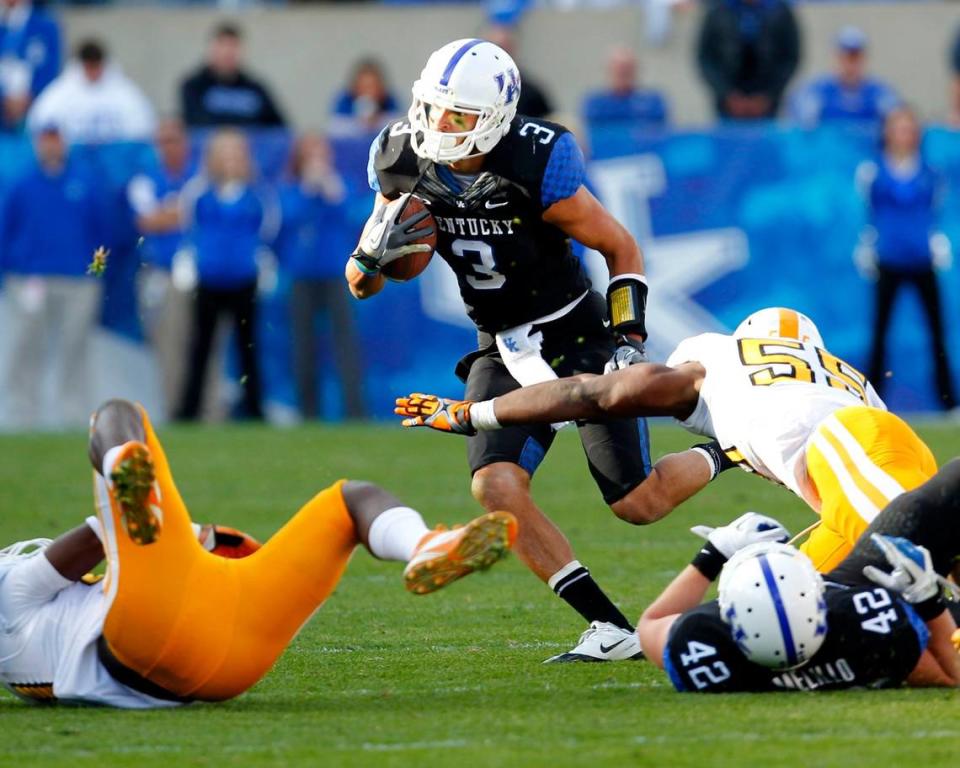Is Saturday the last time Tennessee will play football in Lexington as an annual UK foe?
- Oops!Something went wrong.Please try again later.
If you have been paying attention, Southeastern Conference football coaches seem to be revealing the future of the league’s scheduling format.
On Oct. 2, Auburn coach Hugh Freeze lamented that the Tigers will soon no longer be playing rival Georgia annually.
“I’ll miss playing Georgia every year because I just got to experience it for my first time and I loved every minute of it other than the outcome,” Freeze said of the Tigers’ 27-20 loss to the Bulldogs on Sept. 30.
Ten days after Freeze’s remarks, Alabama head man Nick Saban boasted that the SEC’s impending adoption of a one-seven scheduling format — one permanent foe played every season and seven rotating league opponents for eight total conference games — will assure greater variety of league competition for the Crimson Tide’s players.
“The way we’re gonna do our seven-team rotation, one team fixed, I think you’re gonna play every (SEC team) every four years, so almost every guy at your school is going to play every team in the conference — which I think is great,” Saban said.
If the “one-seven” plan is in fact the SEC’s future, that could mean that No. 19 Tennessee’s appearance at Kroger Field Saturday at 7 p.m. (EDT) is the last one the Volunteers will make in Lexington as an annual opponent of the Kentucky Wildcats.
Which, if true, will be a major bummer.
Other than 1943 — when neither Kentucky nor Tennessee fielded football teams due to World War II — UK and UT have played football every season since 1919.
"I'll miss playing Georgia every year."
Did Auburn Head Coach Hugh Freeze let a MASSIVE scheduling change in the SEC slip out?
See the full interview here: https://t.co/ZazXgxAs0t#CFB #WarEagle #GoDawgs pic.twitter.com/MHbBNzEmQh— The Next Round (@NextRoundLive) October 2, 2023
The SEC’s football-scheduling uncertainty is owed both to the impending additions of Oklahoma and Texas to the league plus the decision to scrap the East-West division setup that the conference has used since first expanding above 10 teams in 1992.
For the Southeastern Conference debuts of the Longhorns and Sooners next season, the league has adopted what is said to be a one-year only slate with eight league games that was designed to maintain existing rivalries for each team.
The 2024 Kentucky schedule includes games with five of UK’s seven current permanent league foes — at Florida, Georgia, South Carolina, at Tennessee and Vanderbilt.
Current SEC East rival Missouri and longtime permanent West Division opponent Mississippi State are missing from the 2024 UK slate.
The rivalry-saving alternative to staying at eight league games with one permanent annual rival and seven rotating opponents would be to move to nine league games with three permanent annual rivals and six rotating foes.
On the “one-and-seven” scheduling model, the likely assignment of permanent foes seems relatively easy to guess: Alabama-Auburn; Arkansas-Missouri; Florida-Georgia; LSU-Texas A&M; Mississippi-Mississippi State; Oklahoma-Texas; Tennessee-Vanderbilt.
That would leave Kentucky paired with South Carolina as its annual “rival.”
Under that scheduling scenario, the one-and-seven formula would end annual marquee rivalry games such as Alabama-Tennessee, Georgia-Auburn, Florida-Tennessee, Alabama-LSU and Florida-LSU.
It would also keep the SEC from restoring yearly rivalries for Texas-Texas A&M, Arkansas-Texas and Oklahoma-Missouri.
The UK administration has been at the forefront among those arguing for the eight-game SEC slate.
Kentucky athletics director Mitch Barnhart has sited player safety concerns and the fact that adding a conference game would ensure half of the SEC teams suffer an additional loss every season among the reasons UK is opposed to a nine-game league slate.
There is merit to those concerns, but if the cost of staying at eight league games once the SEC goes to 16 teams is doing away with so many important rivalries as annual contests, then that price is too high.

Saturday’s UK-UT contest will be the 119th meeting between the Wildcats and the Volunteers, the third-most played rivalry among Southeastern Conference schools.
Only Auburn-Georgia (128 games) and Mississippi-Mississippi State (who will meet for the 120th time on Nov. 23) have played more often than have the Cats and Vols.
Across multiple generations, no entity has caused Kentucky sports fans more distress than has the Tennessee football program.
The Volunteers lead the all-time series with the Wildcats 83-26-9. Since World War II, UT has gone 59-15-3 against UK. In the 2000s, the Vols have won 20 of 23 meetings against the Cats.
Even when — as in 2018 and 2021 — Kentucky clearly has the better team than Tennessee, the Big Orange has had a knack for besting the Big Blue.
Those Cats backers for whom the sight of Tennessee orange triggers their rivalry ire should likely feel urgency to give full vent to their feelings Saturday night at Kroger Field.
If what Saban and Freeze are saying about future SEC football scheduling is true, you will likely soon be seeing less of the “Rocky Toppers” in these parts.
Blue Preview: Storyline, odds and key players to watch for UK football vs. Tennessee
What impact will Texas and Oklahoma moving to the SEC have on UK? It’s complicated.
Kentucky’s past with Oklahoma and Texas has included both triumph and heartache
How Oklahoma and Texas rank vs. the current SEC schools in sports and academics
In spending on sports, how Oklahoma and Texas match up with the current SEC members

